22 Best Fruit And Vegetable Juices For Healthy And Glowing Skin
Radiant skin is a drink away with replenishing ingredients like tomatoes, carrots, etc.

Image: Shutterstock
The skin needs proper nutrition to stay healthy, radiant, and youthful. And drinking juices is the quickest way to get all the nutrients. Here, we have discussed everything you need to know about juices for glowing skin. While consuming whole food is crucial, juices are especially beneficial when you are in a hurry.
Fresh fruits and vegetables contain vitamins, minerals, micronutrients, and antioxidants that help maintain the skin’s structural integrity and neutralize the free radicals to slow down signs of aging, wrinkles, thin skin, pigmentation, and other issues.
This article explores 22 beneficial juices for your skin, how they work, the recommended daily intake, and more. Read on.
Best Juices For Glowing Skin
Key Takeaways
- Beta-carotene, which is abundant in carrot juice, may help increase skin moisture and suppleness.
- Antioxidants and anti-inflammatory qualities found in beetroot juice may help protect from oxidative damage.
- High levels of vitamins C and A in grape juice may help to enhance skin texture.
- Kale juice may improve collagen as it is rich in vitamins, carotenoids, and polyphenols.
- Try blending instead of juicing to get maximum nutritional value.
How Do Juices Benefit Your Skin And Overall Health?
Fruits and vegetables are loaded with vitamins, nutrients, and antioxidants that keep your body healthy.
They strengthen your immunity and help reduce the risk of cardiovascular diseases. When your body receives all the vital nutrients, it shows up on your skin.
However, it is always recommended to eat whole fruits and vegetables. As per experts, during the juicing process, the fruits and vegetables lose dietary fiber, which is important for your body. While studies comparing the benefits of whole foods and juices are inconclusive, researchers recommend consuming whole fruits and vegetables over juices (1).
Considering the busy lifestyles of the modern day, drinking juice for glowing skin is also a great way to incorporate more vitamins and essential nutrients into your diet.
Note: As per the Dietary Guidelines for Americans, the daily calorie intake for a person should be 2000 calories. It should include 2 cups of fruits and 2.5 cups of vegetables. Unless recommended otherwise by your doctor, you can consume 2 cups of fruits (whole or juiced, without peels and pits) and 2.5 cups of vegetables (whole or juiced) (2).
The USDA has a chart of the daily recommendations of fruits (3). According to the chart, the recommended daily intake for average adults is:
| Daily Recommendation | Age Group | Measurement |
|---|---|---|
| Women | 19-30 years | 2 cups |
| 31-50 years | 1 ½ cups | |
| 51+ years | 1 ½ cups | |
| Men | 19-30 years | 2 cups |
| 31-50 years | 2 cups | |
| 51+ years | 2 cups |
The same measurement is applicable for 100% fruit juices (1 cup of whole fruit = 1 cup of 100% fruit juice). The standard measurement of 1 cup (in the US) is 8 fluid ounces (roughly 237 ml).
1. Carrot Juice
Carrot
is considered one of the healthiest foods, and carrot is the one of the most skin-nourishing juices. It is a storehouse of carotenoids (beta-carotene, a form of Vitamin A that is good for skin), flavonoidsi Phytochemical compounds in plants that have anticancer, anti-inflammatory, antioxidant, antiviral, and other medicinal properties. , and antioxidants and also improves your immune response. It has wound-healing abilities and helps to reduce inflammation and the damage caused by harmful free radicals (4).
Recommended Daily Intake
A cup (100 grams) of raw carrot contains 41 kcal, 5.9 mg vitamin C, 0.983 mg niacin, 1 microgram lycopenei A powerful antioxidant that prevents skin aging by stabilizing the DNA structure in the nucleus of specialized skin cells. , and 0.66 mg vitamin E (alpha-tocopherol) (5). It also contains other essential nutrients beneficial for your skin. You may consume 2.5 cups of raw or juiced carrots every day. Consult a dietitian for a better understanding of the recommended intake value as per the needs of your body.
2. Tomato Juice
Tomato is one of the best superfoods for glowing skin. It is rich in beta-carotene and lycopene, a bright red-carotene found in red fruits and vegetables. Lycopene can protect your skin from damage caused by UV rays (also called photodamage) (6). It can protect your skin from sunburn, signs of photoaging, and pigmentation caused by UV exposure.
Recommended Daily Intake
A glass of tomato juice (200-250 ml) contains enough lycopene to meet your daily recommended intake (7).
3. Lemon Juice
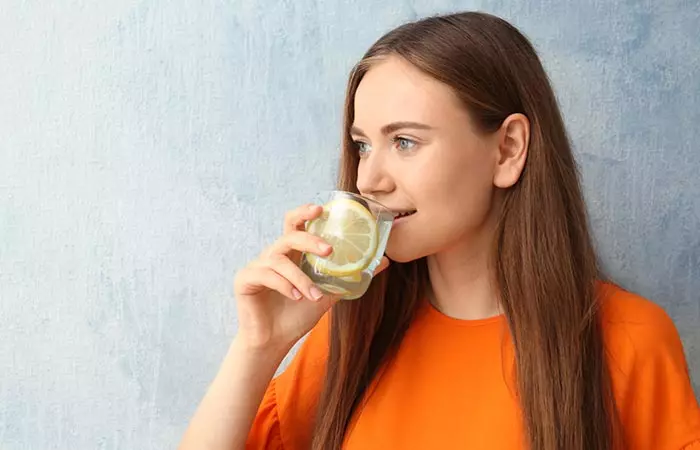
Citrus fruits, especially lemons and limes, are rich in vitamin C (ascorbic acid). Vitamin C is essential for collagen synthesis. This is an important component of your muscles, tissues, and skin. Moreover, the intake of vitamin C regenerates alpha-tocopherol (Vitamin E) in your body, which is another important antioxidant that helps to maintain your overall health and keeps your skin healthy and glowing (8).
Recommended Daily Intake
The recommended daily intake of vitamin C for men is 90 mg, and women are 75 mg (8).
 Quick Tip
Quick Tip4. Beetroot Juice
Eating (or drinking) beetroot strengthens the antioxidant defense of your body and protects the cells from oxidative damage.
Beetroot juice is one of the most vitamin-packed juices to include in your diet. Betalains (red pigments found in beetroot) are anti-inflammatory agents. Test-tube and animal studies found that beetroot helped reduce blood pressure and manage cardiovascular issues (9).
Recommended Daily Intake
A cup (100 grams) of beetroot contains 4.9 mg vitamin C, 1.61 g protein, 9.56 g carbohydrates, 23 mg magnesium, 33 IU vitamin A, 40 mg phosphorus, and 325 mg potassium (10). You may consume 2.5 cups of raw or juiced beetroot every day or consult a dietitian to know the recommended intake value as per the needs of your body.
5. Pomegranate Juice
Pomegranate
has therapeutic and medicinal benefits. Pomegranate juice is a skin rejuvenating juice. It is a rich source of ascorbic acid (vitamin C), citric acid, and small amounts of all amino acids. The juice, extracts, and oil of this fruit were found to reduce UVB induced damage and prevent photoaging (11).
Recommended Daily Intake
You may eat 2 cups of pomegranate (fruit or juice) each day as recommended by the USDA or consult a dietitian for the right dosage.
6. Orange Juice
Orange juice, like any other citrus juice, is an antioxidant-rich juice owing to its rich vitamin C (ascorbic acid) content. It keeps your skin healthy. It is rich in flavonoids that reduce inflammation and oxidative stress. Orange juice is found to reduce the risk of cardiovascular conditions (due to its anti-inflammatory effects) (12).
Recommended Daily Intake
You may have 1 ½-2 cups of the fruit every day, depending on your age, or follow the daily recommendations suggested by your dietitian.
7. Cucumber Juice
The cells in your body need hydration from within. Otherwise, your skin will look dull and lifeless. Consuming cucumber or cucumber juice is the best way to replenish water levels in your body and keep your skin glowing. Cucumber contains 95% water and is rich in beta-carotene, flavonoids, vitamin K, and lignans that provide vital nutrients to your body and improve cell functioning (13). Making it one of the most effective hydration-boosting juices.
Recommended Daily Intake
A cup of cucumber contains only 15 kcal calories and 95% water (14). You can consume 1 ½ cup – 2 cups of cucumber (whole or juiced) every day.
8. Apple Juice

An apple a day can improve your mean and maximum lifespan. It is believed to be a great fruit for glowing skin. Animal studies showed that it had stress resistance properties. Apart from lifespan, apples were also found to improve overall healthspan, damage caused by UV exposure, and functions of the immune system (15).
Recommended Daily Intake
You may drink a cup or two of apple juice in a day or as directed by your dietitian.
9. Papaya Juice
Papaya is a natural beauty booster that contains beta-carotene, which can keep your skin healthy. This carotenoid is a photoprotector. In other words, it protects your skin from damage caused by UV rays and UV-induced erythema (skin redness and irritation) (6).
Recommended Daily Intake
You may have 1 or 2 cups of papaya (whole fruit or juice) or consume it as directed by your dietitian.
10. Spinach Juice
Spinach
, whether raw or cooked, is rich in antioxidants, vitamins, minerals, and dietary fiber. Spinach juice is an effective radiant skin juice. It contains omega-3 fatty acids and other anti-inflammatory compounds that can help maintain overall health and skin health (16).
Recommended Daily Intake
Boil 2-2 ½ cups of spinach in water to make this juice. You can add any additional ingredients recommended by your nutrition. Have this juice every day as part of your diet plan for glowing skin. However, if you have joint issues, consult your nutritionist or the doctor about your spinach intake. Spinach contains high levels of purine, and excessive purinesi Carbon and nitrogen compounds found in food that can result in gout or increased uric acid levels upon overconsumption. can increase your uric acid levels.
11. Grape Juice

Grapes contain polyphenols and flavonoids (that are mainly contained in the seeds and the skin) that have anti-inflammatory and antioxidants effects. Making grape juice a healthy anti-inflammatory juice. It can improve neurocognitivei Pertaining to the process of thinking and reasoning, like the ability to remember, process, concentrate, learn, and speak. function and was found to improve memory decline in older adults. The antioxidants in the grape seed extracts can bond with collagen and prevent premature aging (17), (18).
Recommended Daily Intake
You may drink or eat 1 ½-2 cups of grape juice or the berries. However, if you have a pre-existing health condition, do not forget to consult your doctor and dietitian.
12. Broccoli Juice
Broccoli is rich in vitamins C and E, flavonoids, carotenoids, and polyphenols (19). These can protect your skin from photoaging, oxidative stress, and inflammation (6).
Recommended Daily Intake
You may have 2-2 ½ cups of broccoli (juiced or blanched or microwaved) every day.
13. Ginger Juice
Ginger juice might just be the healthy skin elixir you are looking for. It contains gingerol and other antioxidants that help prevent UVB-induced oxidative stress and decrease inflammation (20). This can help prevent inflammatory health issues and also keep the skin healthy.
Recommended Daily Intake
Daily intake of 2-4 grams of ginger can help prevent chronic diseases (21). However, it is recommended to consult a dietitian or a doctor to know the right amount of ginger you should consume, depending on your body’s needs and condition. Pregnant women and lactating mothers avoid taking ginger without consulting the doctor.
14. Aloe Vera Juice
The topical application of aloe vera juice can help manage skin issues (such as psoriasisi A chronic skin disease that causes itchy rashes and scaly patches that mainly affects the knees, elbows, trunk, and scalp. and dermatitisi A common skin irritation that involves dry, itchy skin or a rash, and may lead to skin blisters that can ooze and flake off. ) and aid wound healing. Drinking aloe vera juice may help reduce inflammation and have beneficial effects on diabetes mellitus and ulcers (22). You may try drinking and applying aloe vera juice or pulp to enjoy its benefits.
Sonia Anastasia, a vlogger, shared her experience of drinking aloe vera juice for 7 days and was amazed with the results. She said, “It looks really good. I do not have 1 pimple. I’m not surprised how it cleared my skin (i).”
Recommended Daily Intake
Aloe vera may interact with certain drugs. Unregulated consumption of aloe vera juice may have toxicological effects, especially during pregnancy (22). It is strictly recommended not to consume aloe vera juice without consulting a doctor.
15. Kale Juice

Kale is rich in vitamins, carotenoids (beta-carotene), and polyphenols, and acts as an immunity-boosting juice. A study found that oral intake of kale improved collagen content and elasticity of the skin. It also reduces oxidative stress, which, in turn, could prevent premature skin aging (23). You can also add kale to fruit and vegetable smoothies.
Recommended Daily Intake
There are no recommendations on kale intake. It is better to consult a dietitian for the right recommendations.
16. Parsley Juice
Get your hands on skin-loving drinks like parsley juice. It contains proteins, vitamins A, B12, C, E, and K, carotene, and essential fatty acids (24). These nutrients keep your skin healthy and contribute to maintaining your overall health.
Recommended Daily Intake
There are no standard recommendations on the daily parsley intake. You can simply add a few sprigs of parsley to any juice or smoothie. This also adds a unique flavor to your juice or smoothie.
17. Grapefruit Juice
Looking for a clear skin juice so you never have to worry about skin inflammation? Grapefruit contains high levels of vitamin C, dietary fiber, potassium, magnesium, and carotenoids, especially beta-carotene, along with several other phytonutrients (25). They are extremely beneficial to reduce inflammation, lower triglyceridei A type of fat (lipid) found in the blood that is formed from over-consumed calories and used as energy between meals. levels, and keep the skin healthy.
Recommended Daily Intake
Half a grapefruit (about 154 grams) offers 100% of the daily value (DV) of vitamin C, 8% of the DV of fiber, and 35% of the DV of vitamin A (25). Hence, you may drink the juice of half a grapefruit every day.
18. Banana Juice
A single banana can provide your body with 23% of the total potassium needed on a daily basis. It is also rich in vitamins A, B6, C, and D (26). A study found that women who had a low daily intake of proteins, potassium, and vitamins A and C had wrinkled skin (27).
Recommended Daily Intake
You may have a smoothie made with 1-2 bananas every day.
19. Pineapple Juice

Pineapple juice is an effective glow-enhancing juice you should add to your diet. The pineapple is rich in essential enzymes and nutrients, such as vitamins B1, B2 B3, B6, and C, along with magnesium, potassium, bromelain, and dietary fiber. All these have anti-inflammatory effects on your body, prevent cardiovascular risks, and keep the skin glowing (28).
Recommended Daily Intake
Eating 3 or more servings of fruits may help reduce the risk of age-related macular degeneration (29). You can eat or drink the juice of 1-2 cups of the fruit.
20. Mint Juice
Mint juice is a summer skin juice containing essential nutrients, such as vitamins A, B6, and C. It also contains dietary fiber, calcium, phosphorus, potassium, zinc, protein, thiamin, and several other nutrients (30).
Recommended Daily Intake
There is no specific recommendation for mint intake. However, you can add a few mint leaves to any juice or smoothie. It has a distinct flavor and aroma that can help enhance the taste of your drink.
21. Sweet Lime Juice
Sweet lime (also called mosambi) is a tropical fruit that is rich in vitamin C, potassium, iron, zinc, copper, calcium, phytochemicals, and antioxidants. It not only keeps your skin healthy but also improves blood circulation and liver function, and helps in weight loss (32).
Recommended Daily Intake
You may drink the juice of one lime every day or as recommended by your nutritionist.
22. Celery Juice
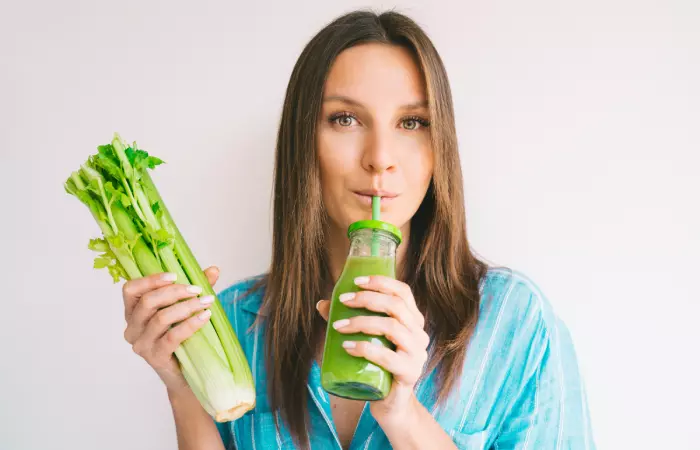
Celery juice is ideal for dull skin and one that you will instantly add to your daily routine. It has an abundance of vitamin C, which helps boost collagen production. This, in turn, helps promote skin elasticity and improve skin tightness (33), (34). Celery also contains luteolin, an antioxidant (35). This compound offers protection against UV damage and helps prevent photoaging (36). Anecdotal evidence also suggests that the antioxidants in celery juice may aid in clearing blemishes and preventing breakouts.
Recommended Daily Intake
You can use four to five stalks of celery to make the juice daily or even consume the vegetable in raw form with a simple yogurt dip.
 Quick Tip
Quick TipIf you are new to juicing, a few simple tips can make the process easier and more enjoyable. Scroll down to learn more!
Juicing Tips For Beginners
Here are some easy tips to get started with juicing:
- Begin with fruits you already like, so it’s easier to enjoy the taste.
- Try different fruit and veggie mixes to find flavors you love.
- Invest in a sturdy juicer that can handle different produce types.
- Drink your juice soon after making it to keep nutrients fresh.
- Store any leftover juice in airtight containers in the fridge to avoid spoilage.
- Clean your juicer right after each use to make maintenance simple.
Before you make juices a part of your daily diet, here are a few important pointers you should keep in mind.
Points To Remember While Drinking Juices For Glowing Skin
- Never start your day with juices. Fruit juices contain fructose, which may overload the liver if taken on an empty stomach. The best time to drink juices is either during breakfast or at any time between breakfast and lunch.
- Avoid adding sugar or artificial sweeteners to the juice. If you want a hint of sweetness, you may add a teaspoon of raw honey to the juice.
- Always have the juice immediately after you have prepared it. The juice starts to oxidize right after it comes in contact with the oxygen in the air. Use a slow juicer to make juices as it will slow down the oxidation process.
- Try blending instead of juicing. This will help you get the maximum nutritional benefits.
- Try not to strain the juice. This ensures that you don’t miss out on the essential fibers.
- Avoid having packaged or canned juices. They contain added sugars and are not as beneficial as freshly made juice.
Infographic: Fruit Juices For Glowing Skin
Fruit juices are packed with essential vitamins and minerals that nourish your skin naturally. They are a beneficial addition to your skin care routine. While there are many fruit juice options available, we have listed the easily available ones in the infographic below. Check it out to know more.

Illustration: StyleCraze Design Team
Drinking fresh fruit and vegetable juices is one of the best ways to ensure you receive all the essential vitamins, nutrients, micronutrients, and antioxidants to maintain your skin health. There are several detoxifying juices for glowing skin that are easy to prepare and taste delicious. In addition, juices benefit our overall health by strengthening our immunity and reducing the risk of cardiovascular diseases. Carrot, tomato, grapefruit, banana, orange, spinach, parsley, aloe vera, cucumber, apple, and broccoli contain essential nutrients that help improve the skin and maintain its glow. Also, it is best to prepare them at home than drink packaged juices.
Frequently Asked Questions
What is better – a juice made with a single ingredient or one with a mix of different ingredients?
Some green veggies, such as kale, parsley, and broccoli, may not taste great alone. Hence, in such cases, you can mix them up with other ingredients.
Which fruit juice should be avoided?
Studies indicate that pear juice should not be consumed by children due to its high fructose and sorbitol levels. The daily consumption of pear juice may lead to carbohydrate malabsorption (33).
Can drinking too much juice be harmful to my skin or health?
Yes. Studies indicate that it can lead to the development of Type 2 diabetes and cause weight gain due to excess calorie intake as well as water toxicity by disturbing the level of sodium and electrolytes in the body. Excessive consumption of fruit juices extracted from oranges and grapes may also increase the risk of skin cancer (34), (35), (36).
Illustration: Best Fruit And Vegetable Juices For Healthy And Glowing Skin
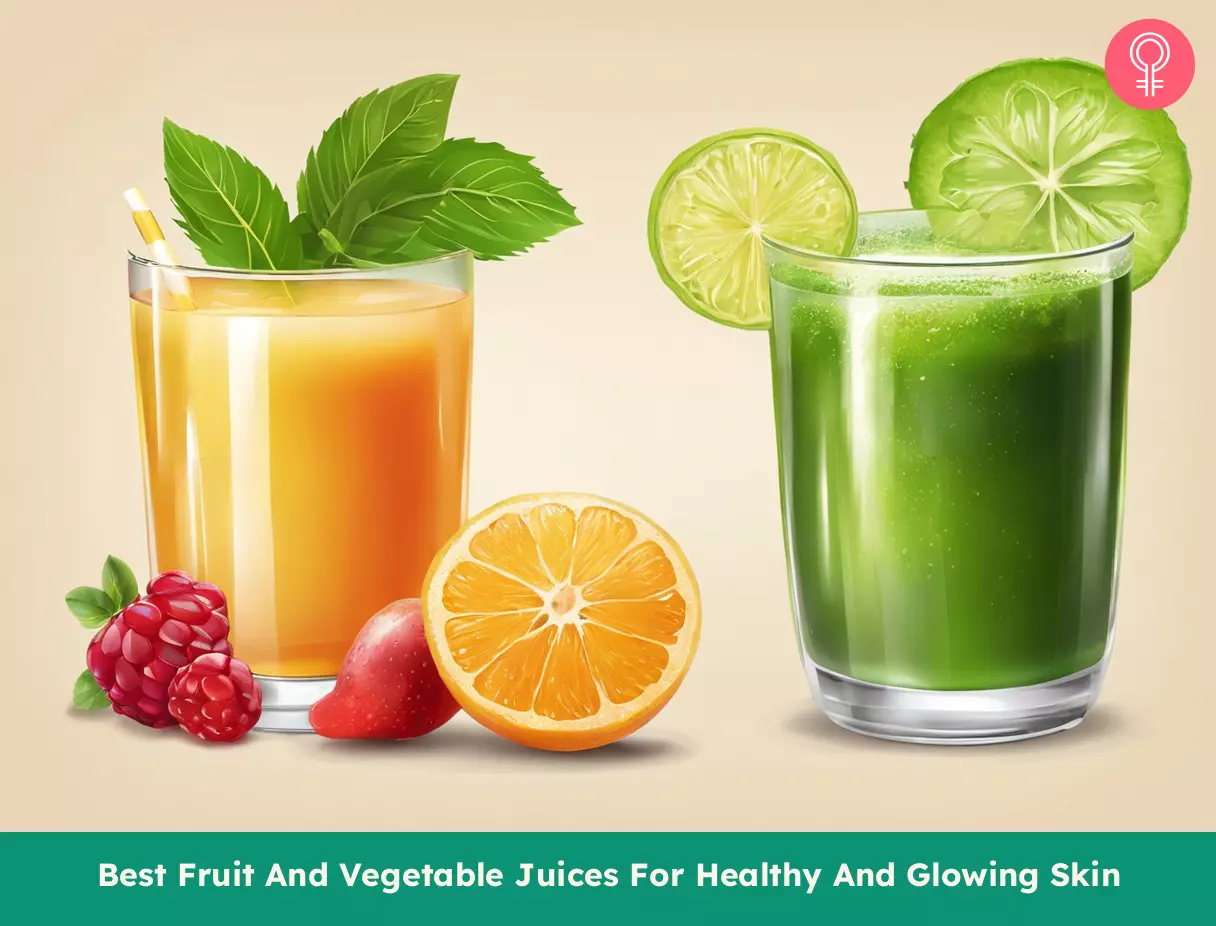
Image: Stable Diffusion/StyleCraze Design Team
Start your day with these 4 simple juices for glowing skin! Check out the video below to get healthy skin with these delicious morning juices.
Personal Experience: Source
StyleCraze's articles are interwoven with authentic personal narratives that provide depth and resonance to our content. Below are the sources of the personal accounts referenced in this article.
i. CLEAR YOUR SKIN IN ONE WEEK DRINKING PURE ALOE VERA JUICE || HORMONAL ACNEhttps://www.youtube.com/watch?v=-gyB1Y9ul1Q
References
Articles on StyleCraze are backed by verified information from peer-reviewed and academic research papers, reputed organizations, research institutions, and medical associations to ensure accuracy and relevance. Read our editorial policy to learn more.
- Trending Cardiovascular Nutrition Controversies, Journal of the American College of Cardiology.
https://www.jacc.org/doi/10.1016/j.jacc.2016.10.086?_ga=2.175847458.1655994995.1516730550-2083515272.1516730550 - Fruit and Vegetable Recommendations Can Be Met for $2.10 to $2.60 per Day, United States Department of Agriculture, Economic Research Service.
https://www.ncbi.nlm.nih.gov/books/NBK469839/ - “Dietary Guidelines for Americans, 2020-2025”
https://www.dietaryguidelines.gov/sites/default/files/2020-12/Dietary_Guidelines_for_Americans_2020-2025.pdf - Nutritional and Health Benefits of Carrots and Their Seed Extracts, Food and Nutrition Sciences, ResearchGate.
https://www.researchgate.net/publication/276499931_Nutritional_and_Health_Benefits_of_Carrots_and_Their_Seed_Extracts - Carrots, Raw, U.S. Department of Agriculture.
https://fdc.nal.usda.gov/fdc-app.html#/food-details/170393/nutrients - Discovering the link between nutrition and skin aging, Dermato-Endocrinology, US National Library of Medicine, National Institutes of Health.
https://www.ncbi.nlm.nih.gov/pmc/articles/PMC3583891/ - Tomato juice nutritional profile, Voprosy Pitaniia, US National Library of Medicine, National Institutes of Health.
https://pubmed.ncbi.nlm.nih.gov/30592869/ - Vitamin C, Office of Dietary Supplements, National Institutes of Health.
https://ods.od.nih.gov/factsheets/VitaminC-HealthProfessional/ - The Potential Benefits of Red Beetroot Supplementation in Health and Disease, Nutrients, US National Library of Medicine, National Institutes of Health.
https://www.ncbi.nlm.nih.gov/pmc/articles/PMC4425174/ - Beets, raw, US Department of Agriculture.
https://fdc.nal.usda.gov/food-details/169145/nutrients - Potent health effects of pomegranate, Advanced Biomedical Research, US National Library of Medicine, National Institutes of Health.
https://www.ncbi.nlm.nih.gov/pmc/articles/PMC4007340/ - Effect of Fresh Orange Juice Intake on Physiological Characteristics in Healthy Volunteers, ISRN Nutrition, US National Library of Medicine, National Institutes of Health.
https://www.ncbi.nlm.nih.gov/pmc/articles/PMC4045306/ - Evaluating the Potential benefits of Cucumbers For Improved Health And Skin Care, The Journal of Aging Research & Clinical Practice, ICFSR.
http://www.jarcp.com/3050-evaluating-the-potential-benefits-of-cucumbers-for-improved-health-and-skin-care.html - Cucumber, with peel, raw, U.S. Department of Agriculture.
https://fdc.nal.usda.gov/food-details/168409/nutrients - Whole apple extracts increase lifespan, healthspan and resistance to stress in Caenorhabditis elegans, Journal of Functional Foods, US National Library of Medicine, National Institutes of Health.
https://www.ncbi.nlm.nih.gov/pmc/articles/PMC3714114/ - Nutritional Value of Spinacia Oleraecea Spinach- An Overview, International Journal of Life Sciences and Review, ResearchGate.
https://www.researchgate.net/publication/316488658_NUTRITIONAL_VALUE_OF_SPINACIA_OLERAECEA_SPINACH-AN_OVERVIEW - Recent Advances and Uses of Grape Flavonoids as Nutraceuticals, Nutrients, US National Library of Medicine, National Institutes of Health.
https://www.ncbi.nlm.nih.gov/pmc/articles/PMC3916869/ - Grape Peel Extract and Resveratrol Inhibit Wrinkle Formation in Mice Model Through Activation of Nrf2/HO-1 Signaling Pathway, Journal of Food Science, US National Library of Medicine, National Institutes of Health.
https://pubmed.ncbi.nlm.nih.gov/31132143/ - Antioxidant properties of green broccoli and purple-sprouting broccoli under different cooking conditions, Bioscience Horizons, Oxford Academic.
https://academic.oup.com/biohorizons/article/doi/10.1093/biohorizons/hzs004/220345 - The Amazing and Mighty Ginger, NCBI, National Institutes of Health.
https://www.ncbi.nlm.nih.gov/books/NBK92775/ - Evaluation of daily ginger consumption for the prevention of chronic diseases in adults: A cross-sectional study, Nutrition, ScienceDirect.
https://www.sciencedirect.com/science/article/abs/pii/S089990071630082X - Evaluation of the Nutritional and Metabolic Effects of Aloe vera, NCBI, US National Library of Medicine, National Institutes of Health.
https://www.ncbi.nlm.nih.gov/books/NBK92765/ - Influences of Orally Taken Carotenoid-Rich Curly Kale Extract on Collagen I/Elastin Index of the Skin, Nutrients, US National Library of Medicine, National Institutes of Health.
https://www.ncbi.nlm.nih.gov/pmc/articles/PMC5537889/ - Parsley, U.S. Department of Agriculture.
https://fdc.nal.usda.gov/food-details/170416/nutrients - Consumption of grapefruit is associated with higher nutrient intakes and diet quality among adults, and more favorable anthropometrics in women, NHANES 2003–2008, Food &
- Nutrition, US National Library of Medicine, National Institutes of Health.
https://www.ncbi.nlm.nih.gov/pmc/articles/PMC4016745/ - Traditional and Medicinal Uses of Banana, Journal of Pharmacognosy and Phytochemistry, Phytojournal.
https://www.phytojournal.com/vol1Issue3/Issue_sept_2012/9.1.pdf - Dietary nutrient intakes and skin-aging appearance among middle-aged American women, The American Journal of Clinical Nutrition, Oxford Academic.
https://academic.oup.com/ajcn/article/86/4/1225/4649573 - [Pineapple Juice Nutritional Profile], Voprosy Pitaniia, US National Library of Medicine, National Institutes of Health.
https://pubmed.ncbi.nlm.nih.gov/31233691/ - Prospective Study of Intake of Fruits, Vegetables, Vitamins, and Carotenoids and Risk of Age-Related Maculopathy, US National Library of Medicine, National Institutes of Health.
https://pubmed.ncbi.nlm.nih.gov/15197064/ - Peppermint, fresh.
https://fdc.nal.usda.gov/food-details/173474/nutrients - Phytochemical and pharmacological properties on Citrus limetta (Mosambi)
https://www.researchgate.net/publication/299536530_Phytochemical_and_pharmacological_properties_on_Citrus_limetta_Mosambi - A Review of the Antioxidant Activity of Celery (Apium graveolens L)
https://www.ncbi.nlm.nih.gov/pmc/articles/PMC5871295/ - The Roles of Vitamin C in Skin Health
https://www.ncbi.nlm.nih.gov/pmc/articles/PMC5579659/ - Citric acid and enzyme-assisted modification of flavonoids from celery (Apium graveolens) extract and their anti-inflammatory activity in HMC-1.2 cells
https://pubmed.ncbi.nlm.nih.gov/34142378/ - Luteolin Prevents UVB-Induced Skin Photoaging Damage
https://pubmed.ncbi.nlm.nih.gov/34526903/ - Consequences of Incomplete Carbohydrate Absorption From Fruit Juice Consumption in Infants.
https://jamanetwork.com/journals/jamapediatrics/fullarticle/347868 - Fatal Water Intoxication
https://www.ncbi.nlm.nih.gov/pmc/articles/PMC1770067/ - Fruit Consumption And Risk Of Type 2 Diabetes: Results From Three Prospective Longitudinal Cohort Studies
https://www.ncbi.nlm.nih.gov/pmc/articles/PMC3978819/ - Citrus Consumption and the Risk of Non-Melanoma Skin Cancer in the Women’s Health Initiative
https://pubmed.ncbi.nlm.nih.gov/33946526/
Read full bio of Dr. Suchana Marahatta
Read full bio of Ramona Sinha
Read full bio of Eshna Das
Read full bio of Krati Darak





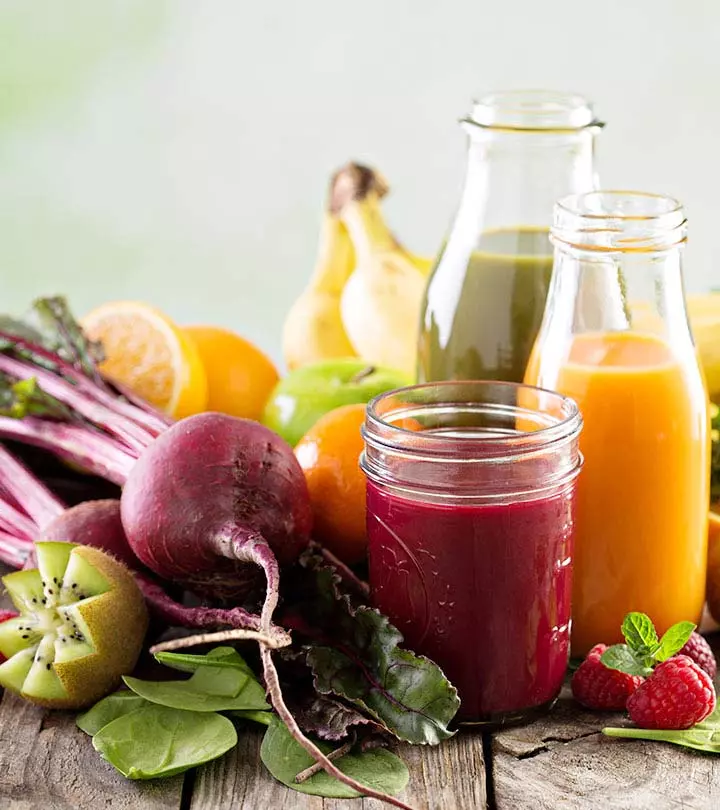

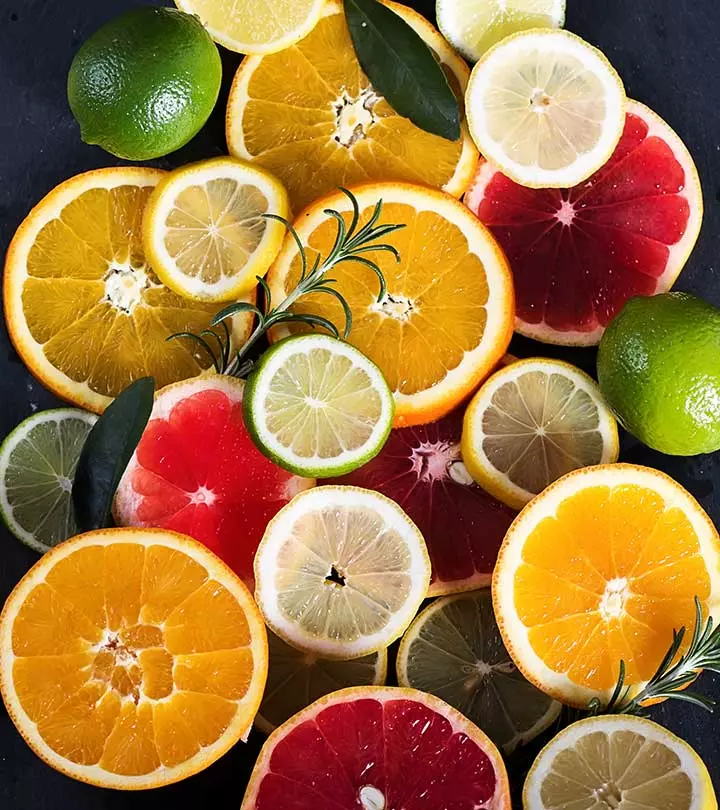

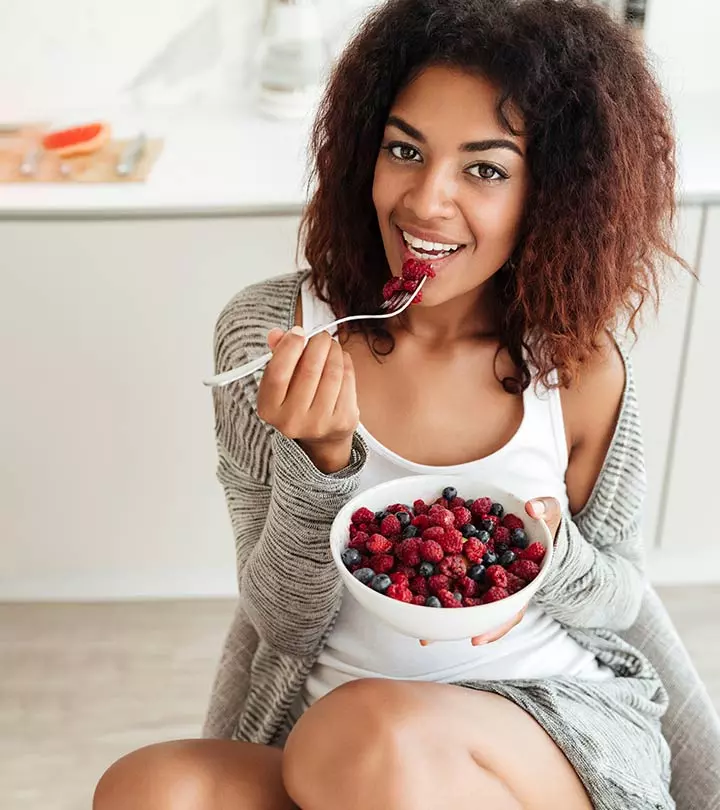

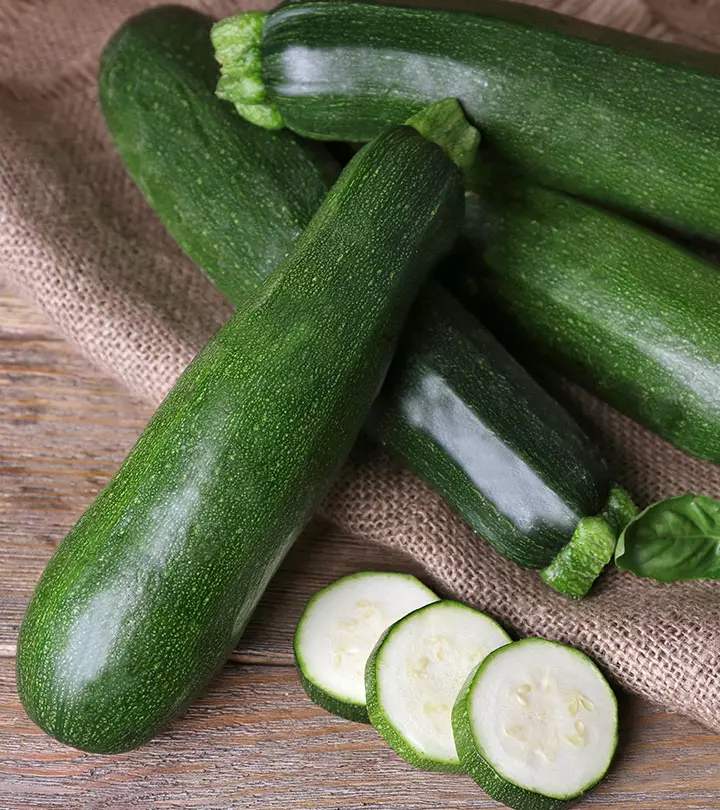
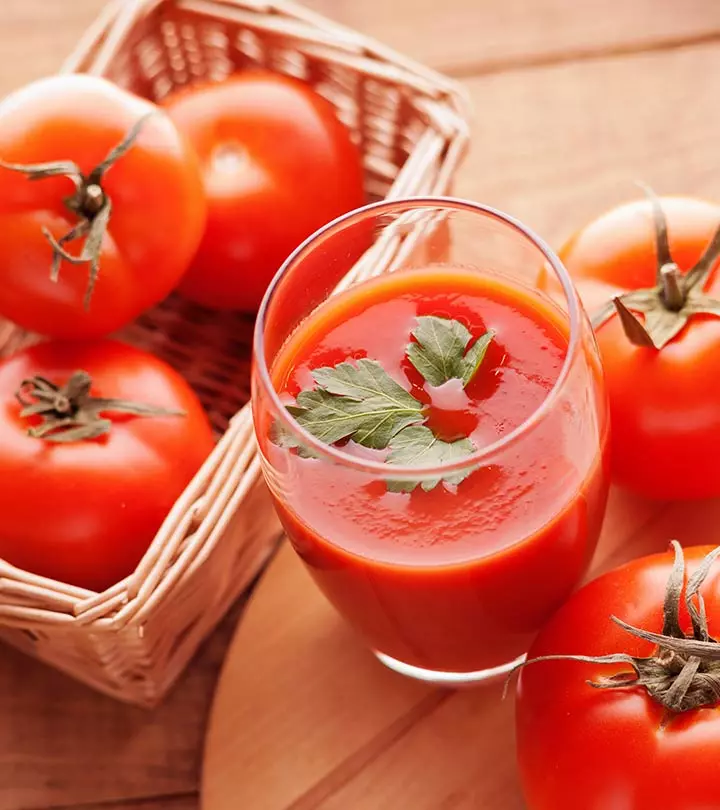
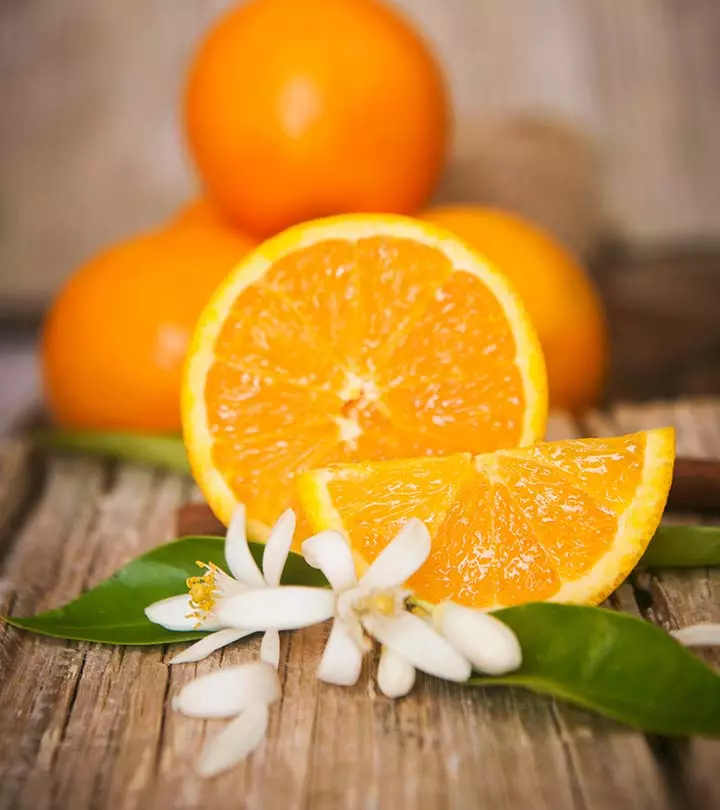









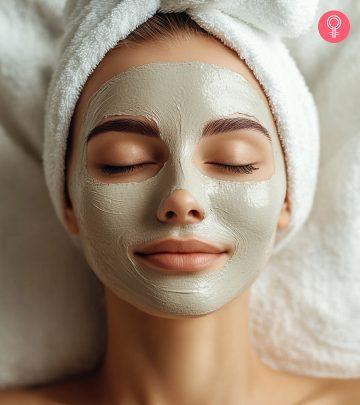

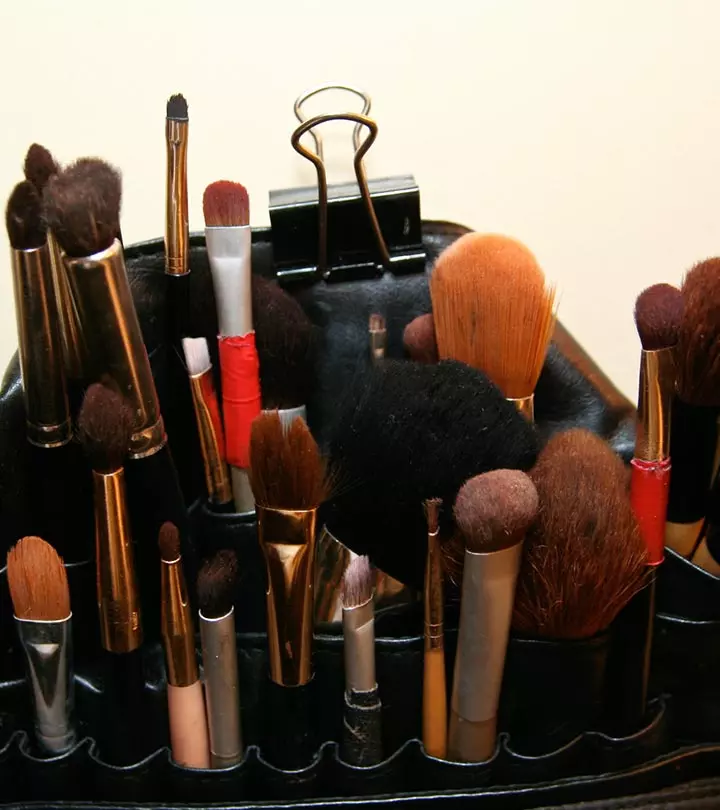
Community Experiences
Join the conversation and become a part of our empowering community! Share your stories, experiences, and insights to connect with other beauty, lifestyle, and health enthusiasts.